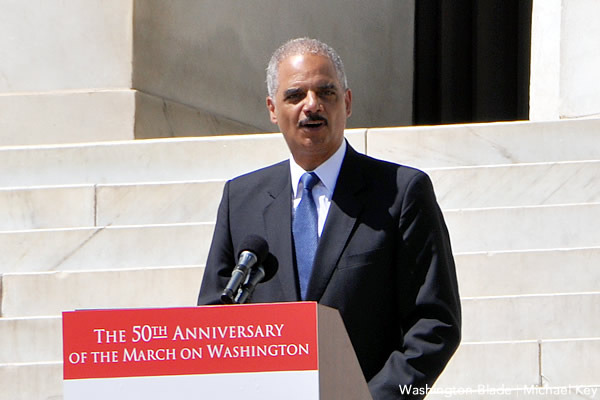News
Months after court ruling, DOMA issues remain unresolved
Social Security, veterans benefits and family leave not flowing in non-marriage equality states


U.S. Attorney General Eric Holder has pledged to extend federal benefits to married gay couples to the furthest extent possible under the law. (Washington Blade file photo by Michael Key)
Ever since the Supreme Court ruled against the Defense of Marriage Act last year, the Obama administration has been rolling out on a continual basis new federal benefits for married same-sex couples — but access to some benefits remains uncertain months after the decision.
While the administration has afforded a preponderance of the 1,138 federal benefits of marriage to same-sex couples, other benefits — including Social Security, veterans and family leave benefits — are still in limbo for those living in non-marriage equality states. For these benefits, federal policy looks to the place of residence, not the place of celebration, in determining whether a person is married.
The policy of the Obama administration has been to expand benefits to married same-sex couples to the furthest extend possible under the law following the court decision against DOMA. That position was formalized last week in a memo from U.S. Attorney General Eric Holder extending certain federal benefits under the purview of the Justice Department to married gay couples.
“It is the Department’s policy, to the extent federal law permits, to recognize lawful same-sex marriages as broadly as possible, and to recognize valid in the jurisdiction where the marriage was celebrated,” Holder writes.
Thus far, the administration has extended numerous benefits to married same-sex couples related to taxes, immigration, federal employee benefits, employer-provided pensions and, most recently, the ability to refuse to testify against a spouse in federal court — even if these couples live in non-marriage equality states. The Justice Department has also ceased enforcement of a provision in Title 38, which governs veterans benefits, that independently defines marriage in opposite-sex terms.
But things get dicier when it comes to other benefits where the law governing them looks to the state law where a couple resides, rather than the state law where the couple was married in determining whether a marriage is legitimate. Does the spirit of the Supreme Court ruling against DOMA mean that these portions of these laws should also not be enforced, or are they so far removed from the ruling they require a legislative fix?
One such issue is with Social Security benefits. Although the Social Security Administration is processing retirement and survivor benefits for same-sex couples living in marriage-equality states, for the time being, it’s placing applications on hold for married same-sex couples living in places that don’t their recognize their union.
Kia Anderson, a Social Security spokesperson, said work coordinated with the Justice Department is still underway to determine whether her agency can recognize these same-sex marriages for benefits purposes.
“We are working with the Department of Justice to develop and implement policy and processing instructions on this issue,” Anderson said. “However, we encourage people to apply right away for benefits, even if they aren’t sure they are eligible. Applying now will protect against the loss of any potential benefits.”
Yet another benefit on hold for married same-sex couples living in non-marriage equality states is veterans benefits, which include disability benefits, survivor benefits and joint burial at a veteran’s cemetery for the spouses of former service members. As with Social Security law, a portion of veterans’ law, 103(c) of Title 38, looks to state of residence, not the state of celebration, to determine whether a couple is married.
Genevieve Billia, a spokesperson for the Department of Veterans Affairs, said her department is still reviewing the issue of these benefits with the Justice Department.
“VA is working closely with the Department of Justice to develop guidance to process cases involving same-sex spousal benefits, and to implement necessary changes swiftly and smoothly in order to deliver the best services to all our nation’s veterans,” Billia said. “Our commitment to provide all veterans and their families with their earned care and benefits will continue to be our focus as VA implements the Supreme Court’s decision in Windsor, and the president’s direction on Title 38.”
The continued enforcement of 103(c) of Title 38 to discriminate against gay couples has been a cause for concern for U.S. senators. Last month, seven senators — led by Sen. Mark Udall (D-Colo.) — called on the Obama administration to stop enforcing the law in a way that blocks gay veterans in same-sex marriages from receiving spousal benefits.
Stephen Peters, president of the American Military Partner Association, called the issue “a top concern” among veterans belonging to the LGBT military group.
“While we understand it takes time to review existing policies and laws in light of the Windsor decision, for the sake of our veterans and their families, our hope is that the administration will take swift action in extending full and equal VA benefits no matter what state the veteran and their family live in,” Peters said. “These veterans have earned these benefits and there is no valid reason why they should continue to be denied them.”
The American Military Partner Association has launched an online petition calling on Holder to stop enforcing U.S. code governing veterans benefits in a way that discriminates against same-sex couples. According to the organization, a little more than 1,000 people had signed the petition as of Wednesday.
Ian Thompson, legislative representative for the American Civil Liberties Union, expressed confidence the administration would be able to come to a conclusion on these issues as it has done with other benefits in the aftermath of the DOMA ruling.
“Federal agencies have moved with commendable speed to extend recognition to married same-sex couples, and to do so in a way that recognizes that these marriages don’t dissolve when a couple crosses state lines,” Thompson said. “While more work remains, including with SSA and the VA, we are confident that these issues can be properly addressed.”
The Justice Department didn’t respond to the Blade’s request for comment on the pace with which these benefits are being rolled out or when these outstanding issues will be resolved.
Shin Inouye, a White House spokesperson, touted the administration’s work so far in implementing benefits as he acknowledged “some work remains.”
“Following the Supreme Court’s ruling in Windsor, the president directed the attorney general to work with the Cabinet to review federal law to ensure the decision and its implications for federal benefits and obligations are implemented swiftly and smoothly,” Inouye said. “That process is ongoing, and while some work remains, the administration has worked to affirm the principle that all couples who are legally married receive full and equal recognition, to the greatest extent possible under the law.”
Should the administration determine it must continue enforcing these laws, a legislative fix from Congress would be necessary to ensure these benefits can flow to gay couples. For the Social Security benefits, that would mean passage of the Social Security Equality Act, sponsored by Rep. Linda Sanchez in the House. For the veterans benefits, that would mean passage of the Charlie Morgan Act, sponsored by Sen. Jeanne Shaheen (D-N.H.) in the Senate.
The federal benefits of marriage across the board would be assured for married gay couples regardless of where they live after passage of the Respect for Marriage Act, which is sponsored by Rep. Jerrold Nadler (D-N.Y.) in the House and Sen. Dianne Feinstein (D-Calif.) in the Senate.
A Senate Judiciary Committee aide told the Blade last year that a Senate hearing was in the works for fall 2013 on the legislation. Although the hearing never took place, a Senate aide told the Blade plans are still underway for a hearing.
“Chairman Leahy continues to push for timely and comprehensive implementation of the Windsor decision, including last week’s landmark announcement that the Justice Department will treat all lawfully married couples equally in federal legal matters,” the Leahy aide said. “Chairman Leahy is committed to taking discrimination out of our laws, and he is working to schedule a hearing and build support for the Respect for Marriage Act.”
Not all the outstanding issues in the aftermath of the DOMA ruling are related to law. Benefits are blocked from flowing to married same-sex couples in non-marriage equality states under the Family & Medical Leave Act not because of statute, but by regulation, which the administration could change at any time without action from Congress.
And that change is already taking place. Last last year, the Department of Labor announced it was changing the regulations for the Family & Medical Leave Act — along with regulations for a slew of other laws — to ensure those benefits flow to married same-sex couples living in non-marriage equality states. According to Thompson’s HR Compliance Expert, the change will be implemented in March.
Laura Fortman, principal deputy administrator of the Labor Department’s Wage & Hour Division, wrote about the proposed change in a little-noticed blog post at the time.
“No one should have to choose between succeeding at work and being a loving family caregiver,” Fortman said. “The FMLA’s protections help ensure that people have the opportunity to be both and our proposed rulemaking is an important step in ensuring the law keeps up with the needs of all families in this country.”
Rea Carey, executive director of the National Gay & Lesbian Task Force, said her organization looks forward to the day when the DOMA decision is “fully implemented” by the federal government.
“Steady progress is being made and more is to come,” Carey said. “For example, we are working with the Department of Health and Human Services to ensure that health insurance plans offer coverage for same-sex spouses regardless of where they live. Big picture, we fully expect this landmark decision to continue to positively impact the lives of LGBT people and their families for years to come and in ways that we haven’t even imagined.”
District of Columbia
LGBTQ budget advocates fight for D.C. resources in a tough fiscal year
‘Trying to preserve life-saving services’ amid $1 billion cut

The months and days leading up to June are especially busy for LGBTQ Washingtonians. For one group, the DC LGBT Budget Coalition, which works year-round to ensure LGBTQ residents are represented and financially supported by the D.C. government, this time of year is their Super Bowl. Beginning in April, the D.C. Council and Mayor’s Office hold budget hearings for the next fiscal year.
With D.C.’s budget now under review, the Washington Blade spoke with Heidi Ellis, coordinator of the DC LGBT Budget Coalition, about the group’s top priorities and their push to ensure continued support for queer communities.
“The LGBTQ Budget Coalition was founded in 2020 at the height of the pandemic, as a way for the community to work together to advocate for key funding and policy changes,” Ellis said. “We recognized we were stronger together. A lot of groups are often pitted against each other for resources and dollars. This coalition was founded out of a need for unity. Since then, we’ve successfully advocated for more than $20 million in dedicated LGBTQ investments.”
In addition to coordinating the coalition, Ellis is the founder and CEO of HME Consulting & Advocacy, a firm that helps build coalitions and advance policy initiatives that address intersectional issues in the LGBTQ community. One of its most powerful tools, she explained, is direct outreach through community surveys.
“We actually do community surveys to see what people need and what’s top of mind,” Ellis said. “Of course, we also pay attention to the broader political landscape — like the current threats to HIV funding. That helps us prioritize.”
Because the coalition is comprised of more than 20 organizations across various sectors —healthcare, housing, community organizing — Ellis said its diversity enables it to connect grassroots needs to potential policy solutions.
“Our coalition includes service providers, community groups, health and housing advocates-folks who are deeply plugged into what’s happening on the ground,” she said. “They help determine our direction. We know we don’t represent every queer person in D.C., but our coalition reflects a wide range of identities and experiences.”
The insights gathered through those surveys ultimately inform the coalition’s annual budget proposal, which is submitted to the Council and mayor.
“That’s how we got to our FY26 priorities,” she said. “This year, more than ever, we’re fighting to protect what we’ve already secured — funding and policies we’ve had to fight for in the past. We know there’s concern around this budget.”
One of the challenges this year is that the D.C. government’s operating budget and some of its legislation must be approved by Congress. With a projected decline in tax revenue and a Republican-controlled Congress that has historically opposed LGBTQ funding, the Coalition has had to think strategically.
“Even before the situation on the Hill, the CFO projected lower revenue,” Ellis said. “That meant cuts to social programs were already coming. And now, with the $1 billion slashed from D.C.’s budget due to the continuing resolution, we’re not only fighting for D.C.’s budget and autonomy, but also trying to preserve life-saving services. Our message is simple: Don’t forget about queer people.”
This year’s proposal doesn’t include specific dollar figures. Instead, the Coalition outlines five funding priority areas: Healthcare, Employment & Economic Equity, Housing, Safety & Community Support, and Civil Rights.
Why no exact amounts? Ellis said it’s because not all solutions are financial.
“Some of our asks don’t require new funding. Others build on existing programs-we’re asking whether the current use of funds is the most effective. We’re also proposing policy changes that wouldn’t cost extra but could make a real difference. It’s about using what we have better,” she said.
When drafting the proposal, the Coalition tries to prioritize those with the most pressing and intersecting needs.
“Our perspective is: If we advocate for the most vulnerable, others benefit too,” Ellis said. “Take LGBTQ seniors. Some may have done well in life but now face housing insecurity or struggle to access affordable healthcare. Many in our coalition are elders who fought on the frontlines during the AIDS epidemic. They bring critical historical context and remind us that Black and brown communities bore the brunt of that crisis.”
“I love our coalition because it keeps us accountable to the moment,” she added. “If we center those most marginalized, we can make an impact that lifts everyone.”
In addition to healthcare and housing, safety remains a top concern. The Coalition has fought to maintain funding for the Violence Prevention and Response Team (VPART), a city-supported group that includes MPD, community-based organizations, and the Mayor’s Office of LGBTQ Affairs. VPART responds to crimes affecting the LGBTQ community and connects victims to legal, healthcare, and housing services.
“We’ve pushed to make VPART more proactive, not just reactive,” Ellis said. “The funding we’ve secured has helped survivors get the support they need. Cutting that funding now would undo progress we’re just beginning to see.”
At the end of the day, Ellis emphasized that this process is about far more than spreadsheets.
“A budget is a moral document,” she said. “If we’re not represented, you’re telling us our lives don’t matter at a time when we need protection the most. When people can’t get food, medicine, housing — that has a devastating impact. These are vital services.”
The DC LGBT Budget Coalition is urging residents to support a letter-writing campaign to D.C. Council members and the mayor. You can send a letter here: https://actionnetwork.org/letters/fully-fund-dcs-lgbtq-communities
Read the full FY26 budget proposal here: https://drive.google.com/file/d/1bTrENnc4ZazJTO6LPrQ3lZkF02QNIIf1/view
Arts & Entertainment
Washington Blade’s Pride on the Pier returns bigger than ever with two-day WorldPride celebration

The Washington Blade’s Pride on the Pier will be extended to a two-day celebration in honor of WorldPride coming to D.C. this year. Taking place on Friday, June 6 and Saturday, June 7 at The Wharf, this year’s event promises more entertainment, more community, and more pride than ever before — all set against the stunning waterfront backdrop of our nation’s capital.
With the addition of Friday, the party kicks off at 3 p.m., with the inaugural WorldPride Boat Parade at 7 p.m. As an Official WorldPride Partner event, the boat parade will feature 30 decorated boats parading along the Washington Channel. For information on signing up for the boat parade contact Stephen Rutgers at [email protected].
Saturday’s signature Pier Party kicks off at 12 p.m., featuring a drag show, DJ’s, streaming of the WorldPride Parade, and the iconic Fireworks Show Presented by the Leonard-Litz Foundation — one of D.C. Pride’s most anticipated spectacles.
“We’re expanding Washington Blade Pride on the Pier to reflect the excitement and momentum building for WorldPride in D.C.,” said Blade publisher Lynne Brown. “It’s a celebration of our community’s progress and a powerful reminder of the joy and visibility Pride brings to the heart of our city.”
Now in its seventh year, Washington Blade Pride on the Pier extends the city’s annual celebration of LGBTQ visibility to the bustling Wharf waterfront with an exciting array of activities and entertainment for all ages. The District Pier will offer DJs, dancing, drag, and other entertainment. Alcoholic beverages will be available for purchase for those 21 and older.
Pride on the Pier is free and open to the public, with VIP tickets available for exclusive pier access, hosted bars, and private viewing areas for the boat parade and the fireworks show. To purchase VIP tickets visit www.prideonthepierdc.com/vip.
Friday VIP: 5-9 p.m., enjoy an air-conditioned lounge, private bathroom, cash bar and complimentary drink.
Saturday VIP Session #1: 2-5 p.m., enjoy an air-conditioned lounge, private bathroom, catered food, and an open bar.
Saturday VIP Session #2: 6-9 p.m., enjoy the air-conditioned lounge, private bathroom, catered snacks and dinner, and open bar with a front-row view of the fireworks.
Event Details:
📍 Location: District Pier at The Wharf (101 District Sq., S.W., Washington, D.C.)
📅 Dates: Friday, June 6 & Saturday, June 7, 2025
🛥️Boat Parade: 7 p.m. (June 6). 🎆 Fireworks Show: 9 p.m. (June 7)
🎟️ VIP Tickets: www.PrideOnThePierDC.com/VIP
Event sponsors include Absolut, Capital Pride, DC Fray, Infinate Legacy, Heineken, Leonard-Litz Foundation, Mayor’s Office of LGBTQ Affairs, Relish Catering, Washingtonian, and The Wharf. More information regarding activities will be released at www.PrideOnThePierDC.com
Maryland
Md. schools plan to comply with federal DEI demands
Superintendents opt for cooperation over confrontation

By LIZ BOWIE | Deciding not to pick a fight with the Trump administration, Maryland school leaders plan to sign a letter to the U.S. Department of Education that says their school districts are complying with all civil rights laws.
The two-paragraph letter could deflect a confrontation over whether the state’s public schools run diversity, equity, and inclusion programs that the Trump administration has called illegal. The Baltimore Banner reviewed the letter, which was shared by a school administrator who declined to be identified because the letter has not yet been sent.
Maryland school leaders are taking a more conciliatory approach than those in some other states. Education leaders in Minnesota, New York, Colorado, Oregon, Vermont, and Wisconsin said they will not comply with the federal education department’s order, the demands of which, they say, are based on a warped interpretation of civil rights law.
The rest of this article can be found on the Baltimore Banner’s website.
-

 Opinions5 days ago
Opinions5 days agoIt’s time for new leadership on the Maryland LGBTQIA+ Commission
-

 The White House5 days ago
The White House5 days agoWhite House does not ‘respond’ to reporters’ requests with pronouns included
-

 Arts & Entertainment5 days ago
Arts & Entertainment5 days ago‘Gay is Good’ Pride Pils Can Celebrates Frank Kameny’s 100th Birthday for WorldPride in D.C.
-

 Sponsored5 days ago
Sponsored5 days agoTHC Drinks: What You Should Know About Cannabis Beverages












